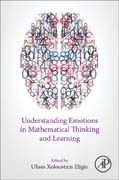
Emotions play a critical role in mathematical cognition and learning. Understanding Emotions in Mathematical Thinking and Learning offers a multidisciplinary approach to the role of emotions in numerical cognition, mathematics education, learning sciences, and affective sciences. It addresses ways in which emotions relate to cognitive processes involved in learning and doing mathematics, including processing of numerical and physical magnitudes (e.g. time and space), performance in arithmetic and algebra, problem solving and reasoning attitudes, learning technologies, and mathematics achievement. Additionally, it covers social and affective issues such as identity and attitudes toward mathematics. Covers methodologies in studying emotion in mathematical knowledgeReflects the diverse and innovative nature of the methodological approaches and theoretical frameworks proposed by current investigations of emotions and mathematical cognition Includes perspectives from cognitive experimental psychology, neuroscience, and from sociocultural, semiotic, and discursive approachesExplores the role of anxiety in mathematical learningSynthesizes unifies the work of multiple sub-disciplines in one place INDICE: 1. What Current Emotion Research Can Tell Us About Mathematical Thinking and Learning 2. Appraising Emotion in Mathematical Knowledge: Reflections on Methodology 3. Being in Control 4. Epistemic States of Convincement: A Study Based on the Professional Practice of Mathematics and on a Neurobiological Model of Affect 5. The Impact of Anxiety and Working Memory on Algebraic Reasoning 6. Students' Emotional Experiences Learning Mathematics in Canadian Schools 7. I did Use to Like Maths.: Emotional Changes Towards Mathematics During Secondary School Education 8. When Being Good at Math isn't enough: How Students' Beliefs About the Nature of Mathematics Impact Decisions to Pursue Optional Math Education 9. Special Needs in Mathematics Classrooms: Relationships with Others 10. The Construct Mathematical Resilience 11. The Emotions Experienced Whilst Learning Mathematics at Home 12. Parents' and Children's Mathematics Anxiety 13. 'I Hate Maths': Changing Primary School Teachers' Relationship with Mathematics 14. Using Students' Emotional Experiences to Guide Task Design in Mathematics Content Courses 15. Digging Beneath Dual Systems Theory and the Bicameral Brain: Abductions About the Human Psyche from Experience in Mathematical Problem Solving 16. On the Irreducibility of Acting, Emoting, and Thinking: A Societal-Historical Approach to Affect in Mathematical Activity 17. Emotional Orientations and Somatic Markers: Expertise and Decision-Making in the Mathematics Classroom
- ISBN: 978-0-12-802218-4
- Editorial: Academic Press
- Encuadernacion: Cartoné
- Páginas: 472
- Fecha Publicación: 01/06/2017
- Nº Volúmenes: 1
- Idioma: Inglés
